Subtotal: £15.48
Golden Melon Discus – Symphysodon aequifasciatus “Golden Melon” 5 to, Enhance Your Aquarium’s Aesthetic with this Beautiful Fish, Ideal for Beginners and Experienced Aquarists Alike, Stunning Addition to Your Freshwater Aquarium
£76.49 Original price was: £76.49.£65.00Current price is: £65.00.
Welcome these beautiful Golden Melon Discus into your aquarium! Their stunning coloration and gentle nature make them ideal community fish. Perfect for both beginners and experienced aquarists, these elegant creatures will flourish in a well-maintained environment, enhancing your aquatic display.
Species Introduction
Essential Care Guide for Your Golden Melon Discus – Symphysodon aequifasciatus “Golden Melon”
The Golden Melon Discus, scientifically known as Symphysodon aequifasciatus, is a stunning freshwater fish that belongs to the Cichlidae family. Originating from the Amazon River basin, this species thrives in warm, slow-moving waters characterized by dense vegetation and soft, acidic conditions. The Golden Melon Discus is renowned for its vibrant coloration, which features a golden-yellow body adorned with striking melon-like patterns. This beautiful fish can grow to a maximum length of 20 cm and is often sought after for its aesthetic appeal in tropical aquariums.
| Optimal Living Conditions | |
|---|---|
| Water Temperature | 24-27°C (75-81°F) |
| pH Level | 6.5-7.5 |
| Water Hardness | 4-12 dKH |
| Minimum Tank Size | 80L (20 gal) |
| Salinity | Freshwater |
| Care Level | Beginner Friendly |
Natural Behavior & Temperament
The Golden Melon Discus is known for its peaceful nature, making it a wonderful addition to community tanks. These fish are social creatures that thrive in groups, ideally in schools of at least five or more. Their natural behavior includes graceful swimming patterns and a tendency to establish hierarchies within their groups. They often seek out hiding spots among plants and decorations, which provides them with a sense of security. Observing their interactions can be quite fascinating, as they communicate through subtle movements and body language.
Tank Setup Guide
Creating an ideal environment for your Golden Melon Discus is crucial for their health and well-being. Start with a spacious aquarium of at least 200 liters to accommodate their size and social nature. The substrate should be soft and sandy, allowing them to forage naturally. Incorporate plenty of live plants, such as Amazon swords and Java ferns, which not only enhance the aesthetic appeal but also provide hiding spots and help maintain water quality. Use driftwood and rocks to create natural structures and territories, ensuring that there are multiple areas for the fish to explore.
Water Quality Management
Important Water Parameter Notice
Maintaining optimal water quality is essential for the health of your Golden Melon Discus. The ideal pH level should range from 5.5 to 7.5, with a preference for slightly acidic conditions. Regular testing of water parameters is crucial, as fluctuations can lead to stress and health issues. The temperature should be kept between 28-30°C (82-86°F), mimicking their natural habitat. Additionally, aim for soft to moderately hard water, ideally between 1-10 dGH. Regular water changes of 20-30% weekly will help maintain water quality, remove toxins, and provide fresh nutrients for your aquatic companions.
Feeding & Nutrition
The diet of the Golden Melon Discus should be varied to ensure optimal health and vibrant coloration. They thrive on high-quality pellets, flakes, and frozen foods such as bloodworms, brine shrimp, and daphnia. A balanced diet is essential for their growth and vitality. Feeding should occur 2-3 times a day, with only as much food as they can consume in a few minutes to prevent water quality issues. It is important to observe their feeding behavior and adjust portion sizes accordingly.
Compatibility Guide
Peaceful Tank Mates
| Compatible Fish | Notes |
|---|---|
| Tetras (e.g., Neon Tetra) | Small, peaceful schooling fish. |
| Corydoras Catfish | Bottom dwellers that help clean the substrate. |
| Rasboras | Active and peaceful, suitable for community tanks. |
| Guppies | Colorful and lively fish that coexist well. |
While the Golden Melon Discus is a peaceful fish, it is essential to avoid aggressive or territorial species that may stress them. A well-planned community tank with compatible species will ensure a harmonious environment for your aquatic companions.
Health & Wellness
Maintaining the health of your Golden Melon Discus involves regular monitoring for signs of stress or illness. Common issues include ich, fin rot, and bacterial infections. Signs of health problems may include lethargy, loss of appetite, or abnormal swimming behavior. To prevent these issues, ensure that water quality is consistently high and that the fish are not overcrowded.
Breeding Information
Breeding Golden Melon Discus can be a rewarding experience for aquarists. These fish are known to be monogamous and will form strong pair bonds. To encourage breeding, provide a separate breeding tank with optimal conditions, including slightly warmer water and a flat surface for spawning.
Acclimation Process
Introducing your Golden Melon Discus to a new aquarium requires a careful acclimation process to minimize stress. Begin by floating the sealed bag containing the fish in the aquarium for about 15-20 minutes to equalize the temperature. After this, gradually introduce small amounts of tank water into the bag over the next hour.
Long-term Care
Golden Melon Discus can live for many years with proper care, often reaching an age of 10 years or more in a well-maintained aquarium. As they grow, it is essential to monitor their size and adjust their living conditions accordingly.
Natural Habitat Recreation
Recreating the natural habitat of the Golden Melon Discus in your aquarium can enhance their well-being and display their natural behaviors. Aim to replicate the soft, acidic waters of the Amazon River basin by using peat moss or driftwood to lower pH levels.
Seasonal Care Adjustments
As seasons change, so too may the care requirements for your Golden Melon Discus. During warmer months, ensure that the water temperature remains stable and does not exceed 30°C (86°F). In colder months, a reliable aquarium heater is essential to maintain a consistent temperature.
Expert Tips
For those looking to provide the best care for their Golden Melon Discus, consider the following expert tips. First, invest in a high-quality water testing kit to regularly monitor pH, ammonia, nitrite, and nitrate levels. Second, maintain a consistent feeding schedule to promote healthy growth and prevent overfeeding.
Troubleshooting
If you encounter issues with your Golden Melon Discus, it is essential to address them promptly. Common problems include poor water quality, which can lead to stress and illness. Regular water changes and testing will help mitigate this risk.
Scientific Background
The Golden Melon Discus is a member of the family Cichlidae, which includes many popular aquarium species. This fish has been studied extensively for its unique behaviors and breeding habits.
Advanced Care Techniques
For experienced aquarists looking to take their care of Golden Melon Discus to the next level, consider implementing advanced techniques such as breeding programs or biotope aquariums.
Frequently Asked Questions
Q: What tank size is required for Golden Melon Discus?
For Golden Melon Discus, a minimum tank size of 200 litres is recommended. These fish require ample swimming space and a stable environment to thrive. A larger tank not only provides more room but also helps maintain water quality, which is crucial for their health. If you plan to keep a group, consider a tank of at least 300 litres to avoid territorial disputes and ensure a harmonious environment. Additionally, a spacious tank allows for the inclusion of plants and decorations, which can mimic their natural habitat and enhance their wellbeing.
✓ Expert Tip
Ensure that your tank is well-cycled before introducing your Golden Melon Discus to avoid stress and potential health issues.
Q: What water parameters do Golden Melon Discus require?
Golden Melon Discus thrive in soft, slightly acidic water with a pH range of 6.0 to 7.5. The ideal temperature for these fish is between 28°C to 30°C. Regular monitoring of ammonia, nitrite, and nitrate levels is essential, as they are sensitive to poor water quality. Aim for a hardness level of 1-10 dGH to replicate their natural habitat. Frequent water changes of 20-30% weekly will help maintain these parameters and promote a healthy environment.
✓ Expert Tip
Utilising a high-quality water conditioner can assist in achieving optimal water parameters, especially in tap water.
Q: How often should I feed Golden Melon Discus?
Golden Melon Discus should be fed 2-3 times daily. It is important to provide a varied diet, including high-quality pellets, frozen or live foods such as bloodworms, and brine shrimp. Ensure that the food offered is appropriate for their size and age. Overfeeding can lead to water quality issues, so only provide as much food as they can consume within 5-10 minutes. Regularly observe their feeding behaviour to adjust portions as needed.
✓ Expert Tip
Incorporating a variety of food types can enhance their colouration and overall health.
Q: What are the best tank mates for Golden Melon Discus?
Golden Melon Discus are generally peaceful and prefer to be housed with similarly gentle species. Ideal tank mates include tetras, corydoras, and other non-aggressive fish that thrive in similar water conditions. It is advisable to avoid fin-nipping species and overly boisterous fish, as they can stress the Discus. Keeping them in groups of at least five will help reduce stress and promote natural behaviour, as they are social fish.
✓ Expert Tip
When introducing new tank mates, acclimatise them slowly to minimise stress.
Q: How do I properly acclimatise Golden Melon Discus to my aquarium?
Acclimatising your Golden Melon Discus is crucial for their health. Begin by floating the sealed bag in the aquarium for about 15-20 minutes to equalise the temperature. After that, gradually introduce small amounts of aquarium water into the bag over the next hour. This helps them adjust to the water chemistry. Once acclimatised, gently net the fish into the aquarium, avoiding adding bag water to your tank. This method minimises stress and reduces the risk of introducing harmful pathogens.
✓ Expert Tip
Keep the aquarium lights dim during the first few hours to help them feel secure in their new environment.
Q: What are the signs of healthy Golden Melon Discus?
Healthy Golden Melon Discus exhibit vibrant colours, clear eyes, and active swimming behaviour. They should have a robust appetite and show no signs of distress or lethargy. Observe their fins; they should be fully extended and free from tears or fraying. Additionally, check for any unusual spots or lesions on their bodies. Regular monitoring of their behaviour and appearance will help you identify any potential health issues promptly.
✓ Expert Tip
Maintain a stress-free environment to keep your Discus healthy and vibrant.
Q: How do I successfully breed Golden Melon Discus?
Breeding Golden Melon Discus requires specific conditions. Start with a separate breeding tank of at least 100 litres, with soft, slightly acidic water. Increase the temperature to around 30°C and ensure excellent water quality. Provide flat surfaces for spawning, such as smooth rocks or breeding cones. Once the eggs are laid, both parents will guard them. After about 48 hours, the fry will hatch and require infusoria or finely crushed food until they grow larger. Patience and careful monitoring are key to successful breeding.
✓ Expert Tip
Breeding pairs often form a strong bond; thus, providing them with a stable environment can enhance breeding success.
Q: What temperature should I maintain for Golden Melon Discus?
The optimal temperature for Golden Melon Discus is between 28°C to 30°C. This range mimics their natural habitat in the Amazon River basin, where they thrive in warm waters. Regularly check the temperature using a reliable aquarium thermometer and make adjustments as necessary. Sudden temperature fluctuations can lead to stress and health issues, so employ a good quality heater to maintain stable conditions.
✓ Expert Tip
Consider using a heater with a thermostat for consistent temperature regulation.
Q: How long do Golden Melon Discus typically live in captivity?
In a well-maintained aquarium, Golden Melon Discus can live up to 10-15 years. Their longevity is heavily influenced by the quality of care they receive, including water conditions, diet, and stress levels. Regular monitoring and timely interventions for any health issues can significantly enhance their lifespan. Providing a spacious, stable environment with suitable tank mates further contributes to their overall well-being.
✓ Expert Tip
Keeping a consistent maintenance routine can help ensure a long and healthy life for your Discus.
Q: What type of substrate is most suitable for Golden Melon Discus?
For Golden Melon Discus, a soft substrate such as fine sand or smooth gravel is ideal. This type of substrate mimics their natural environment and helps prevent injuries to their delicate bodies. Avoid sharp or rough materials that could harm their fins. Additionally, a natural substrate can support beneficial bacteria, aiding in biological filtration and maintaining water quality.
✓ Expert Tip
Incorporating live plants alongside the substrate can enhance the aesthetic and provide hiding spots for your Discus.
Q: What behavioural patterns should I expect from Golden Melon Discus?
Golden Melon Discus are known for their gentle and social behaviour. They typically swim gracefully through the tank, often in pairs or small groups. You may observe them establishing a hierarchy within the group, displaying subtle signalling behaviours. They can also exhibit territorial behaviour during breeding, especially when guarding their eggs. Regular interaction with their environment and tank mates is a sign of a healthy, comfortable fish. Stress or illness may lead to lethargy and hiding, so monitor their behaviour closely.
✓ Expert Tip
Creating a well-planted environment can help reduce stress and encourage natural behaviours.
Q: How can I prevent common diseases in Golden Melon Discus?
Preventing diseases in Golden Melon Discus begins with maintaining optimal water quality. Regular water changes, monitoring parameters, and ensuring a stable environment are crucial. Quarantining new arrivals before introducing them to your main tank can prevent the spread of pathogens. Additionally, providing a varied diet rich in nutrients strengthens their immune system. Regularly observing your fish for any behavioural changes or physical signs of illness is essential for early detection and treatment.
✓ Expert Tip
Implementing a stress-free environment will significantly reduce the likelihood of disease outbreaks.
Q: What lighting conditions do Golden Melon Discus prefer?
Golden Melon Discus thrive in subdued lighting that mimics their natural habitat. Bright, harsh lighting can cause stress and discomfort. Consider using a combination of LED lights with a dimmer or placing floating plants to diffuse the light. This not only enhances their colours but also provides a more comfortable environment. Regularly observe your fish to ensure they are behaving normally under the lighting conditions provided.
✓ Expert Tip
Adjusting the lighting duration to 8-10 hours daily can help maintain a healthy routine for your Discus.
Q: How do I recognise stress in Golden Melon Discus?
Signs of stress in Golden Melon Discus include hiding, excessive fin clamping, and erratic swimming patterns. They may also lose their appetite or display changes in colouration. If you notice these behaviours, it is essential to assess the tank conditions, including water parameters and tank mates. Stress can lead to serious health issues, so it is vital to address the root cause quickly. Regular observation and maintaining a stable, clean environment will help minimise stress levels.
✓ Expert Tip
Creating hiding spots and maintaining a calm environment can significantly reduce stress in your fish.
Q: What natural habitat conditions should I replicate for Golden Melon Discus?
To replicate the natural habitat of Golden Melon Discus, focus on creating a warm, soft, and slightly acidic environment. Incorporate plenty of plants and driftwood to mimic the Amazon River’s lush surroundings. This not only provides hiding spots but also creates a more natural and secure environment for your fish. Maintaining stable water parameters, including temperature and pH, will further enhance their comfort and well-being.
✓ Expert Tip
Using natural materials in your aquascaping can significantly improve the overall aesthetic and comfort for your Discus.

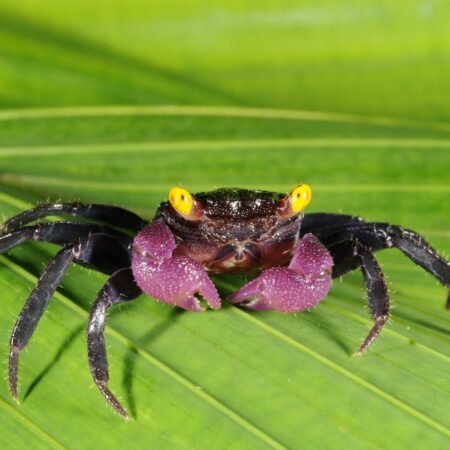 Purple Vampire Crab - Geosesarma Dennerle - Decapod Crustacean
Purple Vampire Crab - Geosesarma Dennerle - Decapod Crustacean 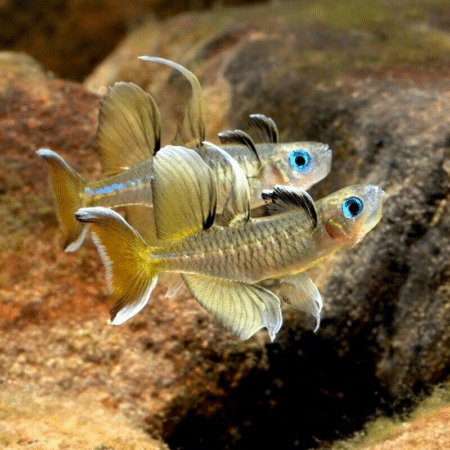

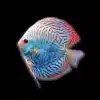
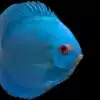
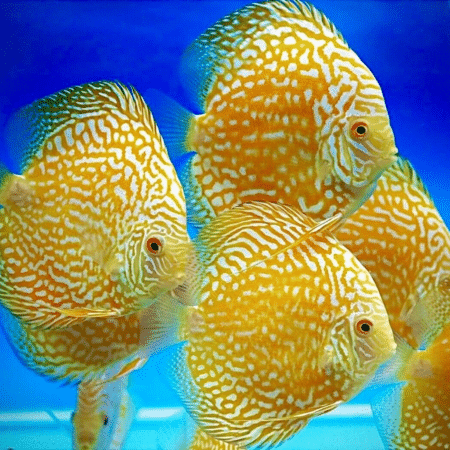
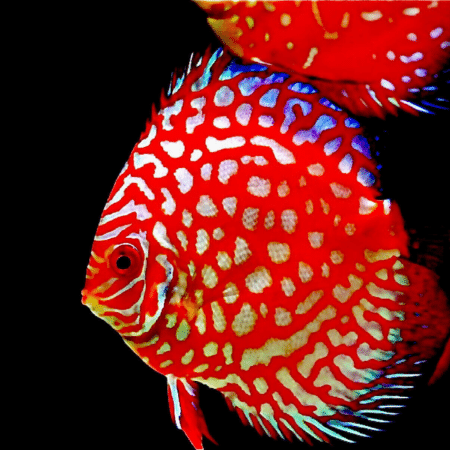
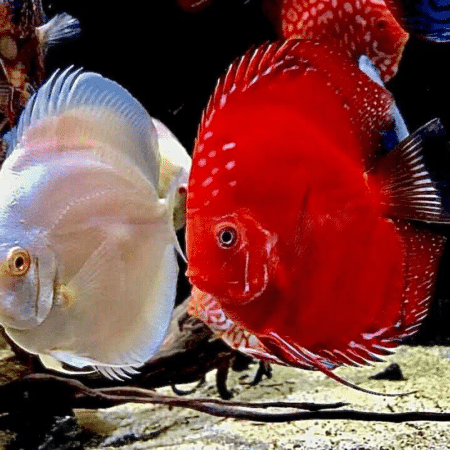


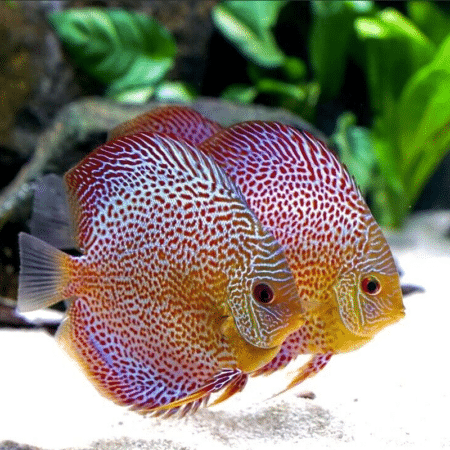
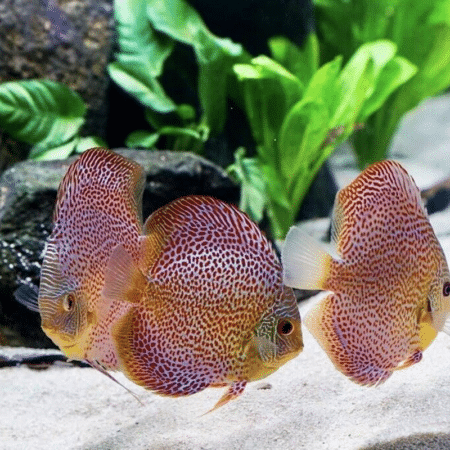
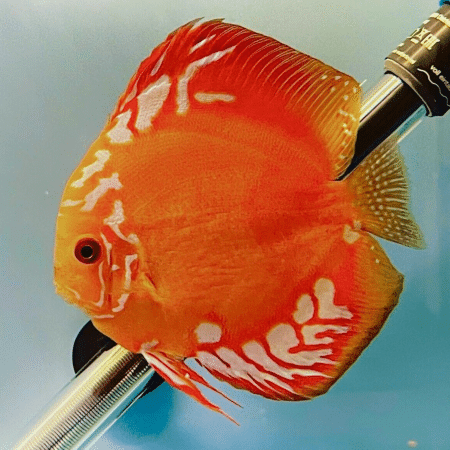
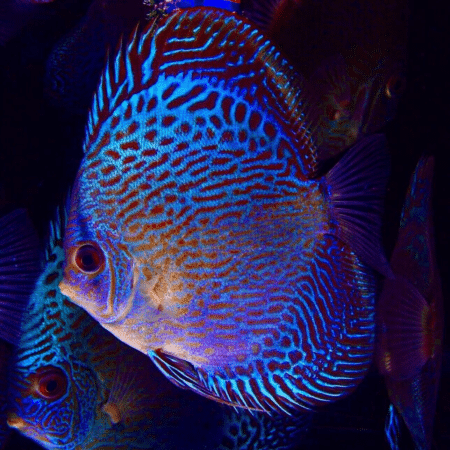
Emily Carter (verified owner) –
I recently acquired a few Golden Melon Discus – Symphysodon aequifasciatus “Golden Melon” (5 to 8 cm) for my 75-gallon tank, and I couldn’t be happier! These beauties arrived in perfect health, and their colors are simply mesmerizing. After a week of acclimation, they’ve settled in wonderfully, showcasing their vibrant oranges and yellows against the greenery of my aquascape.
What I love most about these fish is their personality. They are quite social and have formed a little group, swimming together and showing no signs of stress. Compared to other discus I’ve owned, their hardiness seems exceptional, which makes me feel more confident as a fish parent. Just be sure to maintain pristine water conditions and a gentle filtration system, as they thrive in stable environments.
It’s clear that these Golden Melon Discus are not just beautiful fish; they bring joy and life to the aquarium. I recommend them to anyone looking to add a splash of color and charm to their setup. Just a heads up: they can be a little picky with food at first, but they quickly adapted to my high-quality flakes. Overall, fantastic purchase, and I would buy again without hesitation!
Emily Richards (verified owner) –
I recently welcomed the Golden Melon Discus into my aquarium, and I couldn’t be happier with this decision! These discus fish are not only breathtakingly beautiful with their vibrant golden hues, but they also have such dynamic personalities. After about two months of keeping them, I’ve seen them adapt wonderfully to my 75-gallon tank, which is beautifully planted with driftwood and soft substrate. They swim gracefully, showcasing their colors, and I find myself watching them for hours!
I appreciate that they are marketed as ideal for both beginners and experienced aquarists alike. As a caring fish parent, I truly believe that their health and happiness come from a well-maintained environment, and they seem to thrive with the right water conditions and quality food.
Comparing them to other aquarium fish I’ve kept, I’ve noticed these discus fish are more engaging and social, often seen interacting with each other and even with me when I approach the tank. The only minor concern is that they can be a bit sensitive to water changes, so maintaining stable parameters is essential.
Overall, I highly recommend the Golden Melon Discus for anyone looking to add a splash of beauty and life to their aquarium. They are a true joy to keep and a fantastic addition for anyone who cares about their aquatic pets!